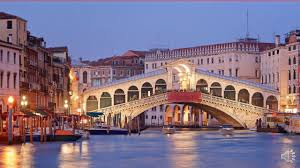Sea Level Rise - How does global warming cause sea level rise?
To recap, global warming is caused
by the action of greenhouse gases refusing
exit to outward bound infra-red radiation. In other words, these gases
(carbon dioxide, methane, nitrous oxide, hydro fluorocarbons, per fluorocarbons,
sulphur hexafluoride and nitrogen trifluoride) being concentrated in the lower
atmosphere trap solar energy being reflected back to space. This heat, being
retained, results in the warming of the atmosphere.
Now, oceans are the lifeblood of
the Earth. These big masses of water covering most of the Earth regulate a lot
of things, including absorbing gases. They also absorb most of the excess heat
on Earth. Rising temperatures as a result of the action of excess amounts of
ghgs[1]
thereby also affects the seas.
Now, by its nature ocean water is
stratified into layers, determined by density and temperature. Because oceans
are very deep, they take time to fully react to external forcing mechanisms.
For example the waters of the deep are still lagging from effects of the Last
Ice Age. For us, in this age of the anthropocene[2],
it means that oceans will continue to react to global warming, because of the
emissions already in the atmosphere and also especially because we unabatedly continue
to emit more, to carbon pollute[3].
How will oceans be affected by
global warming? Two significant effects are coral bleaching and sea level rise.
Sea level rise is caused primarily
by two processes. One is ice melt from the polar ice caps and glaciers,
adding to the volume of water in the seas, the second is thermal expansion of
sea water because of the rising temperatures.
Now sea level isn’t uniform
throughout every inch of the world’s oceans. In some areas it is higher or
lower than elsewhere due to factors like subsidence of land or even up-rising land. It also differs due to
sea currents, volume of water being drained into the ocean by rivers at a
particular places.
The 3 major world oceans are The Pacific, The Atlantic and The Indian Ocean.
They are separated from each other by the land masses otherwise it would be just
one big mass of water. There is one ocean, separated by dry land.
Now, some of the effects of sea
level rise are of course premier most,
the submersion of coastal cities- bear in mind that more than 50% of Earth’s
population lives in cities and the largest 7 cities in the world are by the
coast.
Contamination of agricultural
soils alongside the contamination of aquifers that provide water for human use
is also another effect of invading sea waters caused by global warming.
Contamination of agricultural
soils with sea water would affect food security, livelihoods and this could snowball
to the economy.
Sea water could also flood
wetlands. An example of coastal wetlands is mangroves which are particularly
and especially sensitive to sea level rise, because for them to flourish, a
specific balance is required. Changes in duration of flooding by invading sea
water could easily cause death of some plants in this ecosystem. Salinity (sea
water is salty) and temperature changes could change the balance needed for
mangroves to flourish. Mangroves thrive in brackish water, where fresh water
meets sea water. Because the ground is waterlogged, these trees have specially
adapted breathing roots, which are found above ground. Mangrove ecosystems are
very unique and support rare species of butterflies, birds and other animals.
Another effect of sea level rise
is that invasion of sea water will also destroy infrastructure built near the
Coast. Bridges and roads, houses and waterfront property, all this is under
threat by rising sea waters. The financial cost of this destruction would be
enormous, factoring in the time and resources it would take to rebuild
infrastructure and the overall cost to the economy.
There would also be massive
interference with the movement of goods and people.
Sea level rise will also lead to
the erosion of beaches. Water moving inland will swallow beaches and alongside wave action will wash away sand in
the beaches. Though beach erosion is a natural process, sea level rise coupled
with the action of climate –strengthened storms, further spells bye bye to the
joy of lounging at the beach. This would affect tourism.
Sea level rise also means that the
destructive ability of storm surges will increase. As a result of global
warming, sea level rise coupled with storms will result into higher levels of
and thus much more destruction by storm surge. Already been experienced, storm
surge is now several inches higher than it was in the beginning of the 20th
century. This is projected to increase as sea level rise increases with the
warming climate.
Seaside cities have been famous
and highly populated since days of old. Centers of government, trade, art and
culture, famous cities include Ephesus and Venice, the last of which is quite
the gem. Venice also known as The Floating City is perhaps most uniquely under
threat because it is also subsiding. Venice is a World Heritage Site and is a
beautiful beautiful city and a noted center of culture.
 |
| The city of Venice - image courtesy of YouTube |
Another significant city is New
York City, the capital of the Free World. The city itself which houses over 8
million people from diverse backgrounds is perhaps the most well-known city in
the world. Sea side cities are bastions of trade
and since most bulky goods in the world are transported by sea, sea level rise
will affect all this.
Lagos, Durban, Rio de Janeiro, Hong
Kong, Sydney, Dar es Salaam, Mombasa, Los Angeles are examples of some of the important
cities by the sea.
A positive effect of climate
change is that as temperatures rise, more and more sea ice melts and this
clears the way for new shipping routes.
Perhaps most significantly
threatened by sea level rise are island states and nations. Situated smack in
the middle of the ocean and on land that rises above water, such states would
be submerged by rising sea waters.
An example of this is Fiji, which
holds the presidency of COP23 which is currently taking place in the city of
Bonn which also serves as the headquarters of the United Nations Framework
Convention on Climate Change (UNFCCC).
For small island nations, climate
change is about life and death. It is a matter of survival. Rising seas will
erode beaches, contaminate lands on which they rely on for agriculture, rising
temperatures affect fish breeding grounds and range and also to a large extent
affect tourism. So for them, just like Africa, climate change is not a matter
of debate. It is about making the best of what they have while fighting to
prevent worse from happening.
It also speaks to the unfairness
of climate change; the most affected are the least contributors. But, we need
to marshal our strength and fight as much as we can. Climate action is not
about blaming, it is a global phenomenon with different areas affected
differently, yet the impacts are almost always destructive. We must come
together and fight this.
Climate action is not about blaming, it is a global phenomenon with different areas affected differently, yet the impacts are almost always destructive. We must come together and fight this.
For young people, as I have mentioned earlier we are to inherit this planet, we are the future of this planet. And because of our unfettered minds and hearts we are able to see outside the notion of countries, states et cetera. We look at and see the whole world, as a place where any person can live where he or she chooses.
Please follow the proceedings of
COP23 live from Bonn. COP23 is meant to work out a rule book for the Paris
Agreement 2015. Remember that change begins with you and the choices you make
in your everyday life. As cliché as it sounds, you need to be the change you
want to see.
You can be the influence you need
[1]
Greenhouse gases
[2]
This is the age where natural processes such as climate are influenced by the
actions of mankind
[3]
Emit excess amounts of carbon dioxide into the atmosphere



Nice read Nancy, so Sydney is the center of culture. Will follow the COP23. Thanks for that
ReplyDeleteYes, alongside Venice... thanks for reading and karibu tena!
ReplyDelete